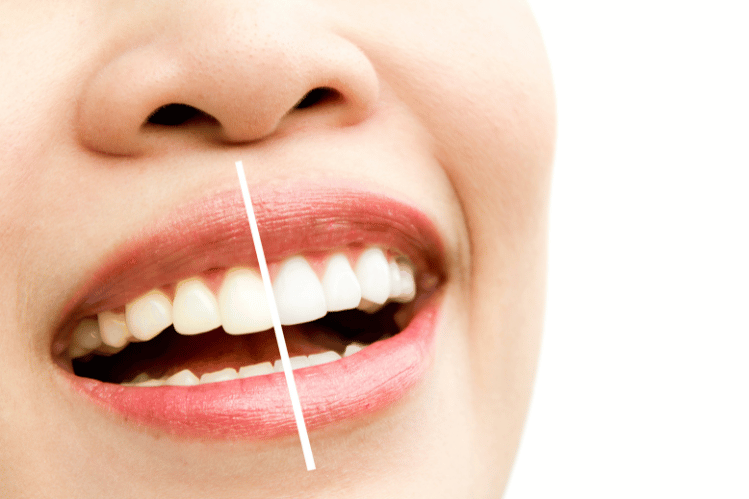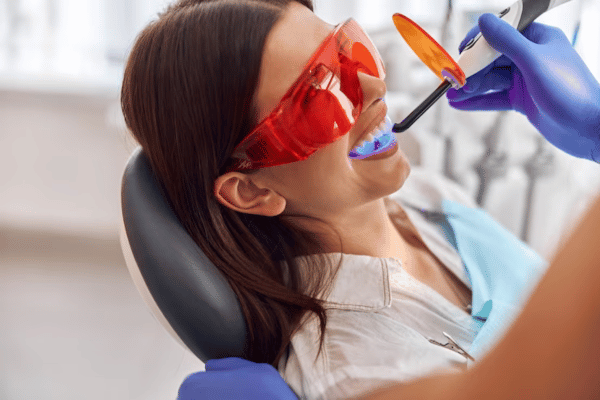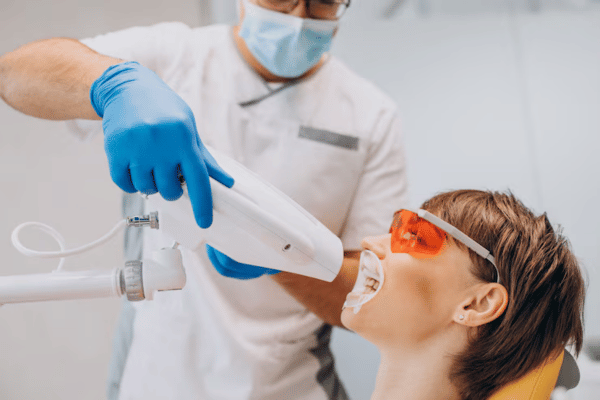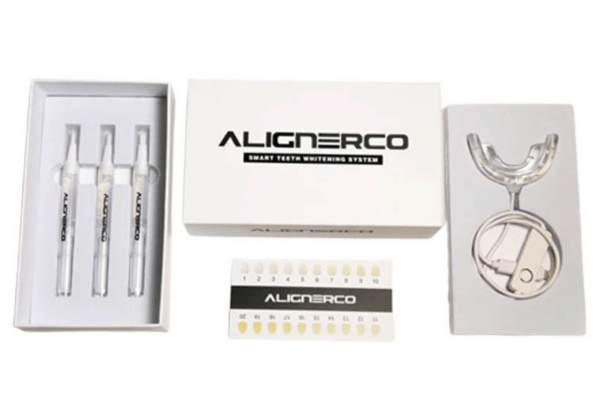
Table of contents
- Teeth Whitening Vs Bleaching: What Is The Difference
- Understanding the Difference: Whitening vs. Bleaching
- Teeth Whitening Options: A Spectrum of Choices
- Choosing the Right Teeth Whitening Option for You
- Important Considerations Before Whitening Your Teeth
- Maintaining Your Bright Smile After Whitening
- Straighten and Whiten: A Powerful Combination for a Picture-Perfect Smile
- ALIGNERCO: Your Gateway to a Straighter, Brighter Smile
- Take the Free Online Smile Assessment
- Conclusion
- FAQs
A bright, white smile is a confidence booster but over time, teeth can become stained and discolored due to factors like coffee, wine, smoking, and even certain medications. This is where teeth whitening comes in – a popular cosmetic dental procedure that aims to restore your pearly whites to their former glory.
However, there's often confusion surrounding the terms "teeth whitening" and "bleaching." Are they interchangeable? Is one better than the other? This comprehensive guide will delve into the world of teeth whitening, explaining the key differences between whitening and bleaching, exploring various treatment options, and helping you achieve a brighter, healthier smile.
Understanding the Difference: Whitening vs. Bleaching
While both teeth whitening and bleaching aim to lighten tooth discoloration, there are subtle distinctions between the two:
Teeth Whitening
This term generally refers to a broader range of treatments that remove surface stains and restore teeth to their natural shade. Whitening products typically contain mild abrasives or gentle polishing agents to buff away stains without altering the tooth enamel itself.
Teeth Bleaching

Bleaching is a more potent form of whitening that utilizes chemical agents like hydrogen peroxide to lighten the actual color of the tooth enamel. Bleaching treatments can achieve a whiter shade than simply removing surface stains, sometimes even surpassing your natural tooth color.
Teeth Whitening Options: A Spectrum of Choices
There's a spectrum of teeth whitening options available, catering to different needs and preferences. Let's explore some of the most common methods:
1. Over-the-Counter Whitening Products
Drugstores and supermarkets offer a vast array of over-the-counter (OTC) whitening products, including whitening toothpaste, strips, gels, and rinses. These products typically contain lower concentrations of whitening agents compared to professional treatments and may take longer to achieve noticeable results.
2. At-Home Whitening Kits
Many brands like ALIGNERCO offer at-home whitening kits that provide custom-made trays and professional-grade whitening gels. These kits deliver faster and more dramatic results than OTC products but still require supervision and guidance from a dentist.
3. In-Office Whitening Treatments

For the quickest and most dramatic whitening effects, in-office treatments performed by a dentist are the gold standard. Dentists use powerful bleaching agents and specialized techniques like lasers or light activation to accelerate the whitening process. These treatments can whiten teeth several shades lighter in a single appointment.
Choosing the Right Teeth Whitening Option for You
With so many options available, selecting the right teeth whitening treatment depends on several factors:
1. Desired Results
Consider how white you want your teeth to be. OTC products may suffice for mild staining, while in-office treatments offer a more dramatic transformation.
2. Sensitivity
Some whitening products can cause temporary tooth sensitivity. If you have sensitive teeth, discuss options with your dentist to minimize discomfort.
3. Budget
OTC products are the most affordable option, while in-office treatments are generally more expensive. At-home whitening kits from dental professionals offer a middle ground.
4. Lifestyle
Consider your lifestyle and commitment level. OTC products and at-home kits require consistent use, while in-office treatments provide quicker results with less user effort.
Important Considerations Before Whitening Your Teeth

Before embarking on any teeth whitening journey, it's crucial to consult with your dentist. Here's why:
- Oral Health Assessment: A dental exam ensures you have healthy teeth and gums suitable for whitening. Cavities, gum disease, or exposed tooth roots can be exacerbated by whitening treatments.
- Professional Guidance: Your dentist can recommend the most appropriate whitening method based on your individual needs and oral health condition.
- Custom-Fitted Trays (For At-Home Kits): For optimal results and comfort, dentists create custom-fitted trays that ensure even application of the whitening gel.
- Sensitivity Management: Your dentist can recommend desensitizing toothpaste or gels to minimize potential tooth sensitivity during the whitening process.
Maintaining Your Bright Smile After Whitening

While teeth whitening can significantly brighten your smile, the results aren't permanent. Here are some tips to maintain your dazzling grin:
- Practice Good Oral Hygiene: Brushing twice a day, flossing daily, and regular dental cleanings are essential to prevent new stains from forming.
- Limit Staining Foods and Drinks: Coffee, tea, red wine, and certain fruits can stain teeth. Minimize their consumption or rinse your mouth with water after indulging.
- Touch-Up Treatments: Periodic touch-up treatments, either with OTC products or professional whitening, can help maintain your desired shade.
Straighten and Whiten: A Powerful Combination for a Picture-Perfect Smile

While teeth whitening tackles discoloration, misaligned teeth can detract from the overall aesthetics of your smile. Here's where ALIGNERCO steps in. ALIGNERCO is an at-home clear aligner brand that offers a convenient and affordable solution for straightening your teeth. Their discreet and comfortable clear aligners gradually shift your teeth into their ideal positions, giving you a straighter, more confident smile.
Why Straighten Before You Whiten?
Straightening your teeth before whitening offers several advantages:
1. More Even Whitening
Misaligned teeth can create areas that are harder to reach with whitening products, leading to an uneven whitening effect. Straightening ensures a more uniform whitening application for a consistent, brighter smile.
2. Enhanced Aesthetics
A straighter smile naturally appears brighter and more youthful. Whitening after straightening further elevates your smile's aesthetics.
3. Improved Oral Health
Straight teeth are easier to clean, reducing the risk of cavities and gum disease. This creates a healthier foundation for long-lasting whitening results.
ALIGNERCO: Your Gateway to a Straighter, Brighter Smile
ALIGNERCO's at-home clear aligner system is a patient favorite for achieving a straighter smile. Here's why:
- Convenient and Discreet: The clear aligners are virtually invisible, allowing you to undergo treatment without impacting your daily life.
- Comfortable Wear: Custom-molded for optimal comfort, the aligners fit snugly over your teeth without irritating.
- Affordable Treatment: Compared to traditional braces, ALIGNERCO offers a cost-effective way to straighten your teeth.
- Remote Monitoring: ALIGNERCO provides remote monitoring throughout your treatment journey, allowing for support without frequent dental visits.
Take the Free Online Smile Assessment
Ready to unlock your dream smile? ALIGNERCO offers a free online smile assessment to determine if their clear aligners are right for you. The assessment takes just a few minutes to complete and provides valuable insights into your teeth straightening needs.
Conclusion
By combining ALIGNERCO's clear aligners with a personalized teeth whitening regimen, you can achieve a smile that's both straighter and brighter. Schedule your free online smile assessment with ALIGNERCO today and take the first step towards a confident, radiant smile!
FAQs
1. Is teeth whitening safe?
Teeth whitening is generally safe for most people when done correctly. However, it can cause temporary tooth sensitivity, especially for those with sensitive teeth.
2. How long do teeth whitening results last?
The longevity of teeth whitening results depends on several factors, including the type of treatment used, your lifestyle habits, and the natural color of your teeth. Typically, results can last anywhere from a few months to a few years.
3. Can teeth bleaching damage my teeth?
While teeth bleaching is effective, using strong bleaching agents unsupervised can damage tooth enamel and irritate gums. Overuse of bleaching products can also make teeth more susceptible to sensitivity.
4. Are there any alternatives to teeth whitening or bleaching?
For mild staining, maintaining good oral hygiene habits like brushing twice daily and flossing can help minimize discoloration. Professional dental cleanings can also remove surface stains and brighten your smile.
5. What if I have crowns or veneers?
Teeth whitening treatments typically don't work on crowns or veneers, as these restorations are color-matched during placement. If you have both natural teeth and restorations, whitening can cause a mismatch in color.

